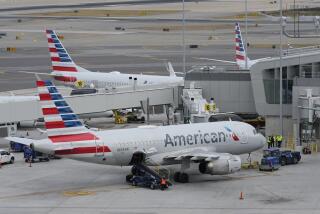U.S. Airlines Succeed in 2nd Fare Hike This Year
- Share via
Major U.S. airlines Monday successfully implemented their second fare increase so far this year, a boost that pushed leisure ticket prices 3% higher and business fares up 1%.
Together with the first 1999 fare hike in late January, the current increase means prices for leisure travel have risen 7% and business travel 3% in just the last five weeks.
For the record:
12:00 a.m. March 18, 1999 For the Record
Los Angeles Times Thursday March 18, 1999 Home Edition Business Part C Page 3 Financial Desk 1 inches; 28 words Type of Material: Correction
Reno Air Inc.--The airline discontinued service between Burbank and San Jose as of Feb. 28. Due to erroneous information from the carrier, the date was incorrectly reported in Tuesday’s editions.
Industry analysts said that while some of the blame for the recent hike can be placed on rising fuel costs, high demand for tickets is just as important a factor.
“If they continue with this momentum, we could see the highest rates in many moons,” said Tom Parsons, editor of Best Fares Discount Travel magazine.
United Airlines started the latest round of increases Thursday, with other major carriers such as Delta Air Lines and American Airlines following suit over the weekend. Air fare increases by an individual airline usually don’t stick unless other carriers also join in.
As a result, passengers booking a flight 21 days in advance from Los Angeles to Atlanta on Delta will pay $611 round-trip, or $18 more than before the latest price hike. Similarly, United passengers from Los Angeles to Chicago buying 21 days in advance will shell out $17 more for a $598 round-trip ticket. A Los Angeles-Chicago ticket in business class purchased at the ticket counter will rise $20 to $2,016.
In a separate development Monday, Reno Air, which is about to be taken over by American, said it will discontinue service at Burbank Airport on April 18 to beef up its flight schedule at LAX.
Reno currently operates four daily flights to San Jose Monday through Friday and three daily flights over the weekend. Airline spokeswoman Nancy Raymond said the lone Reno Air plane servicing the Burbank-San Jose route will be transferred to LAX as part of company plans to add flights on the LAX-San Jose route.
American played down fuel costs as the major reason for the latest fare increase.
“Certainly that was a factor, but we were matching the others,” said American spokesman Bill Dreslin.
Jet fuel costs remain relatively low--about 36 cents a gallon in the first week of March, according to a report from securities firm BT Alex. Brown. That’s up 7% from the previous week but still down 19% from a year ago.
“We’re starting to see a little bit of a creep back up,” Southwest spokeswoman Beth Harbin said, without providing specifics.
The airlines have made five attempts to raise prices so far in 1999 after relative stability for about 18 months. The carriers were unable to increase prices primarily because Northwest Airlines was holding out. Northwest has been having labor problems with flight attendants and mechanics.
This time around, Northwest matched the rise Saturday night.
Whereas business travel ticket prices have been rising during the last three years, most advance-purchase tickets have gotten cheaper, meaning prices overall have been somewhat stable.
The strong U.S. economy has kept demand among business travelers and vacationers high, along with airline profits.
US Airways, for instance, filled a record 73% of its seats last year. The industry average was 62% in 1990, according to the Air Transport Assn., a trade group.
After a slowdown in the last quarter of 1998, however, some analysts worried that the industry might be in for trouble.
Then on Monday, United’s parent, UAL Corp., said its earnings per share would be about $1.35 for the first quarter, well above analyst predictions of $1.12 as compiled by research firm First Call. Annual profit will be between $10 and $12 a share, UAL said; analysts had expected $9.12.
The fare increase and UAL’s rosy earnings outlook boosted airline shares. In New York Stock Exchange trading, UAL surged $6.69 to close at $73.75; Delta jumped $5 to close at $69; and American’s parent, AMR Corp., rose $3.75 to close at $61.75. Southwest shares also rose, adding $2.94 to close at $34.16, also on the NYSE.
Heavy passenger demand has meant few empty middle seats and few alternatives for passengers when a flight was canceled. Passengers have become increasingly unhappy with service.
During a recent snowstorm, more than 4,500 travelers were stranded by Northwest for up to eight hours aboard 34 planes unable to take off or reach gates.
Since then, several bills that would strengthen the rights of air travelers have been debated in Congress.
More to Read
Sign up for The Wild
We’ll help you find the best places to hike, bike and run, as well as the perfect silent spots for meditation and yoga.
You may occasionally receive promotional content from the Los Angeles Times.






